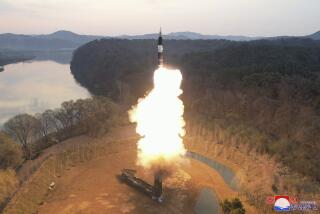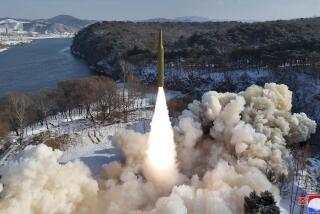As North Korea counts down, Japan talks tough
Nervous Japanese officials know that the first moments after North Korea launches a rocket will be critical: Barely seven minutes after liftoff, it is likely to be hurtling over Japan’s northern coast.
In 1998, Japan was caught unaware when the second stage of a North Korean test rocket sailed over its main island before dropping into the ocean.
This time, North Korea says it plans to put a satellite into orbit. The U.S. and its allies say they fear the launch will actually serve as a test for a ballistic missile.
Either way, nominally pacifist Japan does not intend to be surprised. North Korea said today that its preparations were complete and the launch was imminent.
Tokyo is proffering some unusually tough talk on the consequences of violating its airspace.
After first hinting that it might shoot down the rocket -- a threat that brought a sharp rebuke from the government in Pyongyang -- Japan has warned that it will intercept any falling debris. The nation has moved to high alert. Some commercial flights have been rerouted from the rocket’s projected flight path.
Officials have deployed three Aegis-class destroyers and repositioned Patriot missile interceptors in northern Japan and the Tokyo city center to head off any debris.
Its ambassador to the United Nations has said that the launch posed “a threat to the security of Japan.”
U.S. Secretary of State Hillary Rodham Clinton this week defended Japan’s preparations, saying it “has every right to protect and defend its territory from what is clearly a missile launch.”
And a North Korea expert said Friday that Japan was right to fear the launch.
“There is a real threat here that must be responded to -- this launch will travel over Japanese territory,” Daniel Pinkston, North East Asia deputy project director for the International Crisis Group think tank, said at a news conference in Seoul. “If that launch fails and breaks up, it could fall on anyone, including innocent schoolchildren. That is an extremely serious event, and North Korea must be held accountable.”
But critics say Japan is exaggerating the risks of flaming rocket debris falling on its populace. In northern Japan, officials say there is no sense of panic. And some analysts say it would be foolhardy to try to shoot down debris with a largely untested missile defense system.
Japan used U.S. assistance to modernize its missile defense after the 1998 scare. Some experts say the new system has not been tested on fragments.
“You just don’t agitate with an untested missile system, scaring your own populace,” said Richard Samuels, director of the Japan Program at MIT and author of the book “Securing Japan: Tokyo’s Grand Strategy and the Future of East Asia.”
Some call Japan’s preparations a political ploy by Prime Minister Taro Aso’s ruling Liberal Democratic Party, which is eager to prove to voters that it has a firm handle on the ongoing North Korean threat.
“This is a party in the middle of an election, running a government with no real experience in international security affairs,” Samuels said.
Others echo Clinton’s remarks, asserting Tokyo’s right to self-defense.
“The Japanese government is simply doing what they should do in a situation like this with North Korea,” said Hajime Izumi, professor of international relations and Korean studies at the University of Shizuoka.
Toshiyuki Shikata, a law professor at Teikyo University and a former lieutenant general of Japan’s Ground Self- Defense Force, acknowledged that the missile defense system had not been tested in a combat situation but said he thought it would work.
“The Japanese have been completely reliant on the United States [for military protection], and I think we are coming to a point where we need to reevaluate the situation,” he said. “Japan did not have the ability to intercept missiles until now. Japan is finally at a place to defend itself should there be an attack.”
Many believe no risk is too great to stand up to North Korean strongman Kim Jong Il, who has long been demonized in the Japanese news media and opinion polls. Japanese are bitter about the unannounced 1998 launch and the memory of fellow citizens who were abducted on their home soil decades ago and taken to North Korea.
“North Korea is the villain from central casting,” Samuels said.
North Korea has stoked Japanese ire by declaring that it will interpret any threat against its launch as an act of war. One general was quoted by Pyongyang’s official Korean Central News Agency as saying that if “Japan imprudently carries out an act of intercepting our peaceful satellite, our people’s army will hand a thunderbolt of fire” to any would-be aggressors.
And in northern Japan, defense missiles deployed in rural areas stand guard.
Hiroyoshi Onodera, an official in Iwate prefecture’s capital, Morioka, near the site of one of the Patriot missile batteries, acknowledged that the chance of falling missile debris hitting his city was low.
“Still, there is a chance. That’s why we are in a crisis management mode,” he said. “I wouldn’t say people are panicking. We are getting just a few calls from mainly people of old age concerned about what they are seeing in the news.
“We are basically telling people the chances of anything falling from the skies are very low and to please go about with your daily activities as planned.”
--
Nagano is a special correspondent.
More to Read
Start your day right
Sign up for Essential California for news, features and recommendations from the L.A. Times and beyond in your inbox six days a week.
You may occasionally receive promotional content from the Los Angeles Times.







